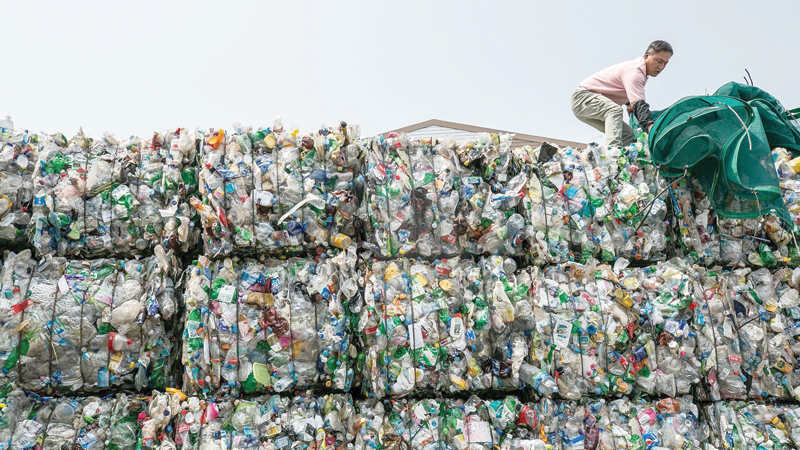

TOKYO: Japan wants to make reducing the glut of plastic waste in the oceans a priority at the Group of 20 summit it is hosting this month as governments around the world crack down on such pollution.
Images of plastic debris-strewn beaches and dead animals with stomachs full of plastic have sparked outrage, with many countries, including more than two dozen in Africa, banning plastic bags outright.
The EU has voted to outlaw 10 single-use plastic items, including straws, forks and knives, by 2021. It has also set targets for all plastic packaging, the top source of plastic waste, to be recyclable by 2030.
Such moves are setting up a showdown with the oil industry, which is pouring billions into new facilities to produce more plastic and other petrochemical products, particularly in Asia.
Refiners such as India’s Reliance Industries and China’s Sinopec are seeking new revenue sources as electric cars become more popular and gasoline and diesel demand slows.
“If the world goes the direction of European targets, some markets can go from high growth to low growth or no growth. Profits could suffer,” said Jeff Brown, president of energy consultancy FGE in Singapore.
Tackling plastic pollution has been less of a priority in Asia, which is the world’s biggest producer of the material — and its waste.
Prime Minister Shinzo Abe of Japan, which is hosting the G20 summit, says he wants his country to lead the world in reducing marine plastic trash, including developing biodegradables and other innovations.
The June 28-29 meeting in Osaka, assembling 20 major economies, including China, Brazil, France and the United States, won’t yield an agreement on targets or concrete steps, two officials involved in preparations said, speaking anonymously because they were not authorised to speak to the media.
A more likely outcome is for G20 environment ministers, gathering this weekend in the mountain town of Karuizawa, to propose ways to enact a vaguely worded “action plan” on marine plastic waste introduced at the 2017 summit in Germany.
Japan, while not a major marine plastic polluter, is the world’s No. 2 consumer of plastic packaging per person after the United States.
Vegetables and fruit sold in supermarkets in Japan are commonly wrapped in plastic, sometimes individually. The cultural emphasis on hygiene, careful packaging and offering products in small portions adds to the problem.
Japanese bureaucrats are working on a law that would require retailers to charge customers for plastic bags — something many supermarkets already do.
Japan also plans to make the medal podiums at the 2020 Tokyo Olympics out of recycled plastic in an attempt to stir consumer awareness about the issue.
Activists say that although efforts to recycle and ban single-use items are needed, reducing plastic production is also crucial.
“There’s a misconception that we can recycle our way out of this,” said Neil Tangri, global plastics policy adviser at the Global Alliance for Incinerator Alternatives in Berkeley, California.
“My fear is that (G20 leaders) will say that plastic production isn’t the problem, it’s waste management,” he added. “We’re saying plastic is a problem you need to tackle at the source.” The world produced about 380 million metric tonnes of plastic in 2015, according to research published in Science Advances journal. The World Bank says humans generated 242 million tonnes of plastic waste in 2016.
About 55 per cent of plastic waste was discarded in 2015, 25 per cent incinerated and 20 per cent recycled. But since plastic was introduced into the consumer market in the 1950s, only 9 per cent of the cumulative total has been recycled, the Science Advances study shows.
Tackling plastic pollution became more of a global priority after China, which had been accepting a hefty chunk of the world’s waste, banned imports at the start of 2018. — Reuters
Oman Observer is now on the WhatsApp channel. Click here



